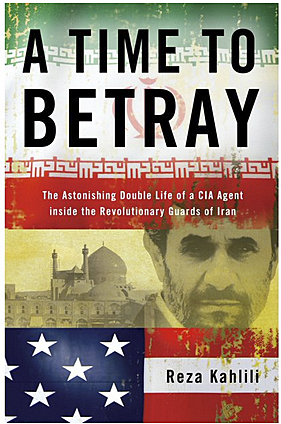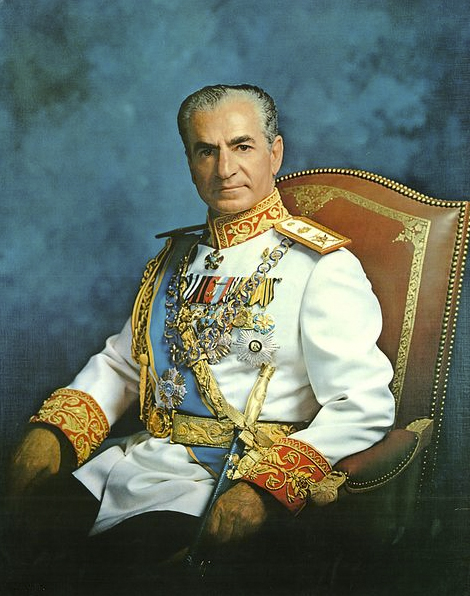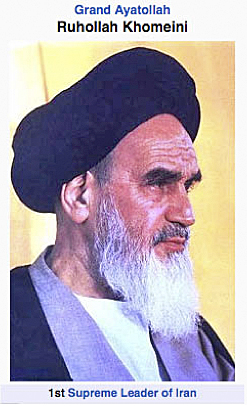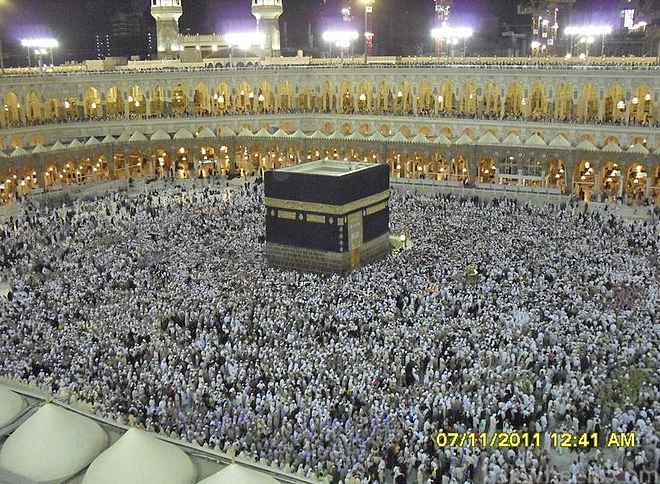
- Articles
Spying from the belly of the beast in the Revolutionary Guards of Iran
Note: The article below written years ago served as one of the springboards for several of Dr. Faria’s Appendices in Stalin, Mao, Communism, and their 21st-Century Aftermath in Russia and China published in 2024 by Cambridge Scholars Publishing, Newcastle upon Tyne, UK. The article was fully expanded, revised, and updated for Appendices B-E dealing with Russia and the Middle East, especially Turkey, Iran, Afghanistan, etc. Those of you who read the Appendices in my book would not be surprised by recent developments and Israel’s obliteration of Iran’s strategic weapons in the June 12th-13th attack. — Editor. https://www.cambridgescholars.com/product/978-1-5275-6437-4
A Time to Betray: The Astonishing Double Life of a CIA Agent Inside the Revolutionary Guards of Iran by Reza Kahlili is one of the most heartrending and enthralling accounts I have ever read of courage, dissimulation, and personal suffering in the genre of espionage memoirs. This is the story of a courageous man, who justly betrays and risks his life (and that of his family) to fight surreptitiously against the cruelties and injustices of the ruling government of his native country — Iran. This book struck a personal cord with me because it reminded me of painful and regretful similarities that beset my own family in my native country, Cuba, just before and after the Revolution that brought to power the dictatorship of Fidel Castro and his brother Raul in 1959.
As a very young child, I remember various members of my family arguing passionately (but amicably) for and against the dictatorial government of Cuban President, Fulgencio Batista, his coup d’etat and dictatorship, his trampling on the legendary Constitution of 1940, the lack of political rights, the cruel imprisonment, and systematic torture of rebels captured while fighting against his regime (an opposition in which my own parents played a clandestine part), etc. I remember my favorite great uncle arguing and warning us about the malevolent changes that the victory of the revolutionary “barbudos” could bring about — but my parents did not listen, and came to regret it! After the triumph of the Revolution in 1959 and the establishment of communism in Cuba, there were indeed drastic “changes,” but this militated changes were for the worse — the inception of a culture of deception, oppression, and terror — and there would no longer be friendly political discussions among families, but only mistrust, dissimulation, and fear.

Eerily, the same thing happened in far away Iran in 1979 with the fall of the Shah Mohammed Reza Pahlavi, the takeover of Iran by the mullahs and the Ayatollah Khomeini, and the inception of a brutal Islamic Republic. Our hero, young Reza Kahlili (a pseudonym) was brought up in a close, prosperous family in Teheran. He remembers the “good old days” of traditional festivities, gatherings, his loving grandfather patriarch defending the ruling Shah of Iran, his ruling dynasty, and the old Persian mores in amicable and engaging conversations among family members. Living in such a warm and jovial atmosphere, Reza, could not have imagine the horrific changes that would be brought about so rapidly in Iranian society with the advent of the “Islamic Republic,” which he joined with excitement after returning to Iran from studying abroad in California.
Nor could he have ventured to guess most of his family and closest childhood friends would so soon be devoured by the Revolution, persecuted by the Iranian Revolutionary Guard, in which he compliantly served the tyranny. The proverb says “be careful what you wish for; you might just get it.” Alas, that is what happened for those who wanted change in Cuba and Iran, deriding and helping to overthrow Batista in Cuba and the Shah in Iran by revolution. Many of those citizens themselves would end up crushed by Castro and the Ayatollah — who turned out to be significantly worse tyrannical figures than their predecessors. And the tragic concatenations that followed in both countries in their wake have not yet ended!

But let us now part from the comparison and focus on Iran and our hero, the subjects of this book. This is an excellent tome, expertly written, personal, passionate, and although it reads fast, like a suspense thriller, it also has interspersed background material recounting brief episodes in the history of Iran that are necessary to the narrative. For example, we learn the Iranians had mixed feelings about (and many resented) the British and Americans, among other reasons, because of interference in their nation’s affair. For example, in 1953 those governments, using the CIA as a vehicle, helped overthrow the democratically elected president of Iran, a (militant) nationalist, Muhammad Mussadegh, who had nationalized the oil industry, and had forced the Shah (a friend of the West) to flee the country.
It is also of historic interest that, as I remember a few years back in 2007, the Iranian president Mahmoud Ahmadinejad, defending his country’s right to a nuclear program, stated, “the country of Iran was heir to a great empire and home to a 2,500-year civilization.” I was surprised at the statement, as I always thought the conquests of Mohammed and the religious and cultural revolution of the 7th century, imposed by the victorious Arabs on the conquered Sassanid Persians, had resulted in a new and distinct Islamic nation. Moreover, with the fall of the Pahlavi Dynasty, the last Persian monarchy, the drastic changes brought about by the revolution of 1979, and the inception of an Islamic Republic (a virtual theocracy), had brought about yet another even more distinct nation. Iranians have a long cultural history as Persians and speak Farsi. Arabs have a more recent civilization, attaining historical distinction with the conquests of Mohammed and speak Arabic. I was gratified that Reza’s loving grandfather and many other more secular Iranians, cognizant of their heritage, agree with my cultural interpretation. These Iranian nationalists and traditionalists think of themselves heir to a distinct but vanishing Persian civilization that had been suppressed culturally by Arab Islamism, and more recently, politically, by the tyranny of the mullahs and the ayatollahs.

I will not reveal the heartrending stories of cruelty and betrayal, as well as dissimulation and courage, that revolve precariously around our hero Reza, who, as a member of the feared Iranian Revolutionary Guard, courageously spied against the cruel regime he ostensibly served. Suffice to say, the brutality of the regime against his friends and the Iranian people changed him into leading a double life, spying for the CIA for over a decade. Among the information Reza provided to the CIA was vital intelligence that probably prevented the collapse of the Saudi government. The Iranians had planned to use the hajj, the religious pilgrimage that Moslems must make to Mecca, to stage a coup d’etat in Saudi Arabia. Armaments were sent by the Iranians for the hajj, but most of these were intercepted and many of the militants arrested beforehand, foiling the insurrection. Other information was communicated to the U.S. at great peril, but not necessarily used properly by the American government, which was bent on placating the mullahs through various administrations.
The double life took its toll, but Reza persisted in his clandestine espionage with the thought of bringing about genuinely real change for the betterment, the attainment of freedom, and improving the life of his countrymen. How he did his self-appointed mission, and how he survived spying at great personal risk from within the belly of the infernal beast are the enthralling subjects of this book.
Without reservations, this heartrending thriller is highly recommended for those who enjoy non-fiction thrillers, recent history, and passionate espionage accounts. Be ready to stay anxiously at the edge of your seat and hold back irrepressible tears of commiseration, sorrow and outrage! I assign it a 5-star rating.
Written by Dr. Miguel Faria
Miguel A. Faria Jr., M.D. is the author of Cuba in Revolution: Escape from a Lost Paradise (2002) and of other books and numerous articles on politics and history, including “Stalin’s Mysterious Death” (2011), “The Political Spectrum — From the Extreme Right and Anarchism to the Extreme Left and Communism” (2011); “America, Guns and Freedom” (2012);”Violence, Mental Illness, and the Brain — A Brief History of Psychosurgery” (2013), etc., all posted at his website haciendapublishing.com
This article may be cited as: Faria, MA. Spying from the belly of the beast in the Revolutionary Guards of Iran, a book review. Haciendapub.com December 1, 2013. Available from: https://haciendapublishing.com/spying-from-the-belly-of-the-beast-in-the-revolutionary-guards-of-iran/
(A Time to Betray: The Astonishing Double Life of a CIA Agent Inside the Revolutionary Guards of Iran by Reza Kahlili. Simon and Schuster, New York, NY., 2010, pp. 340.)
The photographs used to illustrate this book review for Hacienda Publishing came from a variety of sources and do not appear in Kahlili’s, A Time To Betray.
Copyright ©2013 Miguel A. Faria, Jr., M.D.
5 thoughts on “Spying from the belly of the beast in the Revolutionary Guards of Iran”
What is the relationship between the Taliban and Al-Qaeda? And who is the resistance in Afghanistan against the Taliban?
Dr. Miguel A. Faria (September 22, 2021): The Taliban harbored Al-Qaeda (that killed almost 3000 Americans and ravaged our political and economic capitals) after 9:11, so we had to respond, and once we did, we were trapped. The Afghans, especially no incarnated in the fanatical Taliban, are a tenacious enemy. The Afghans are not conquered for long by any nation. They eventually defeated the British in the 19th, the Russians in the 20th; now the US in the 21st century!
Ahmad Massoud, leader of the National Resistance Front of Afghanistan is the 32-year-old son of freedom fighter hero Ahmed Shah Massoud, the Tiger of the Panjshir, leader of the Northern Alliance, staunch friend of the US, for thick and thin, assassinated by Al-Quaeda and the Taliban on the eve of 9:11 so he could not help the US! https://en.wikipedia.org/wiki/Ahmad_Shah_Massoud
A little history… Kandahar, the second largest city in Afghanistan, was a major outpost of the Achaemenid ancient Empire of Persia before taken by Alexander the Great who founded the old city of Kandahar in the 4th century BC, Alexandria of Arachosia (like Alexandria of Egypt, which was another). Many empires have fought over the city because of its strategic location at the crossroads of southern-central Asia.
Alexander the Great has been the only invader to conquer the ancient Afghans; his successor generals ruled ancient Afghanistan (Bactria) for over 100 years! There are still popular ballads sung and tales told in this area about Alexander the Great exploits, the only person to conquer them!
I love historic challenges, so let me correct a few points:
TT: 1.What of Parthia, and Scythia, in regards Bactria, and current Afghanistan?…
Dr. Faria: The Parthians controlled Persia from the mid-3rd century BC to mid-3rd century AD. This was more than 100 years after Alexander. They took those territories from the late Seleucid kings who were weak. At that time they also controlled or influenced part of Bactria, which is today mostly northern Afghanistan. The Scythians raided Bactria from Southern Russia, Georgia, Azerbaijan, some were assimilated in Bactria, but they never conquered Bactria. They remained raiders of the steppes of the aforementioned countries around the northern and flank areas of the Black and Caspian seas and southern Russia. What we know of the Scythians largely come from Herodotus’ Histories, which I highly recommend.
TT: … Since [there were] two groups occupying that area during Alexander’s time, [were they] conquered by Alexander, because the history I’ve read does not say that.
Dr. Faria: Your history is incorrect. The Achaemenid Persians occupied all that area from the Aegean Sea in the West to Bactria in the east — Ionia, Turkey, Syria, Palestine, Iran, Iraq, Cyprus, Egypt, northwestern Afghanistan (later denoted Bactria). The Persian kings were the “King of Kings”! At the time of Alexander’s conquest, the king was Darius III, who Alexander defeated in every battle they fought. The Achaemenid Persian empire was founded by Cyrus the Great (606 BC-530 BC.) and was destroyed and conquered by Alexander the Great (356 BC- 323 BC) from 332 BC to 328 BC. After Alexander the Great died, his successors held all the territories conquered: Ptolemy, Egypt; Seleucus or Seleukos, Syria, Babylonia, Persia, Afghanistan. Seleucid Greeks seceded and founded independent Bactria. Thrace was taken by the general Lysimachus. Macedonia by Antigonus, etc. Most of the information on Bactria is from numismatic history. There is only one good book to my knowledge, which of course, I have read and keep in my library. There are also books on Alexander, Seleukos, etc., also about the Parthians— mostly about the wars with Rome, which in the end they always lost! If you are serious about these histories I can recommend the best books I have read and keep in my library.
Tobrknot Tobfree: Recommend away, But have yet to get to the books by 19th century historians which I have regarding Parthia and Scythia..
Dr. Miguel Faria: Here are the books you need to read for a starter, and they don’t have any major historical flaws! 1. Bactria — The History of a Forgotten Empire by HG Rawlinson (1912; republished 2013). 2. Leviathan vs Behemoth — the Roman-Parthian Wars 66 BC -AD 217 by Cam Rea (2014). 3. The rise of the Seleukid Empire 322-223 BC by John D. Grainger (2018).
This Week in History: Ayatollah Khomeini returns to Iran— Although revolution in Iran was likely to happen with or without Khomeini, his return ensured it became an Islamic Revolution. https://www.jpost.com/Features/In-Thespotlight/This-Week-in-History-Ayatollah-Khomeini-returns-to-Iran
This day in History: Iran hostage rescue mission ends in disaster.
On April 24, 1980, an ill-fated military operation to rescue the 52 American hostages held in Tehran ends with eight U.S. servicemen dead and no hostages rescued. With the Iran Hostage Crisis stretching into its sixth month and all diplomatic appeals to the Iranian government ending in failure, President Jimmy Carter ordered the military mission as a last ditch attempt to save the hostages. During the operation, three of eight helicopters failed, crippling the crucial airborne plans. The mission was then canceled at the staging area in Iran, but during the withdrawal one of the retreating helicopters collided with one of six C-130 transport planes, killing eight service members and injuring five. The next day, a somber Jimmy Carter gave a press conference in which he took full responsibility for the tragedy.—Histyorydotcom.
The hostages were released immediately after Ronald Reagan assumed the Presidency another 270 days later. Iran became a harsh theocratic dictatorship and has remained so to this day! Some people have protested, some have been killed by the government to suppress freedom. Others have been executed for opposing the government openly, so others have done surreptitiously.
Spying from the belly of the beast in the Revolutionary Guards of Iran is my review of A Time to Betray: The Astonishing Double Life of a CIA Agent Inside the Revolutionary Guards of Iran by Reza Kahlili is one of the most heartrending and enthralling accounts I have ever read of courage, dissimulation, and personal suffering in the genre of espionage memoirs. This is the story of a courageous man, who justly betrays and risks his life (and that of his family) to fight surreptitiously against the cruelties and injustices of the ruling government of his native country — Iran. This book struck a personal cord with me because it reminded me of painful and regretful similarities that beset my own family in my native country, Cuba, just before and after the Revolution that brought to power the dictatorship of Fidel Castro and his brother Raul in 1959… — Dr. Miguel Faria 😎
… Under Admiral Stansfield Turner (CIA Director, 1977-1981) during the presidency of Jimmy Carter (U.S. President, 1977-1981), the CIA suffered even more serious setbacks, including drastic cutbacks in personnel (e.g., 820 clandestine CIA officers were dismissed in the so-called “Halloween massacre” of 1977). Its powers were severely trimmed so that the agency was virtually de-fanged in intelligence and counterintelligence (CI) capabilities. As a result, America was to suffer humiliations and defeats unparalleled in her history. The Soviets and their surrogate warriors, the Cubans, were playing for high stakes. Like toppling dominoes, country after country on three continents fell prey to communism and revolution: Ethiopia fell to the communists (1973) and the revered King of the Ethiopians, Haile Selassie I, was deposed and assassinated; Mozambique (1975) and Angola (1976) also fell followed by civil wars; the Sandinistas, backed by the Cubans and Soviets, took Nicaragua in 1979; the Russians invaded Afghanistan and murdered its president, turning the country into a puppet nation and its mountainous terrain into Russian killing fields; the Shah of Iran, Muhammad Reza Pahlavi, fell from power in the Iranian Revolution led by the Ayatollah Khomeini, and fled his country; finally, the economic problems facing the U.S., on top of the Iran hostage crisis (1979-1980) and the failed Carter helicopter desert mission to rescue the American hostages, triggered a complete and general demoralization of the United States. President Carter called it a “general malaise.”— Dr. Miguel Faria
“Tucked away in a lane in the southern end of India’s financial capital, Mumbai, is a museum dedicated to the followers of one of the world’s oldest religions, Zoroastrianism. The Framji Dadabhoy Alpaiwalla Museum documents the history and legacy of the ancient Parsi community – a small ethnic group that’s fast dwindling and resides largely in India.
Now estimated at just 50,000 to 60,000, the Parsis are believed to be descendants of Persians who fled religious persecution by Islamic rulers centuries ago. Despite their significant contributions to India’s economic and cultural fabric, much about the Parsi community remains little known to the mainstream population and the wider world…” https://www.bbc.com/news/articles/cvgv445jqr1o